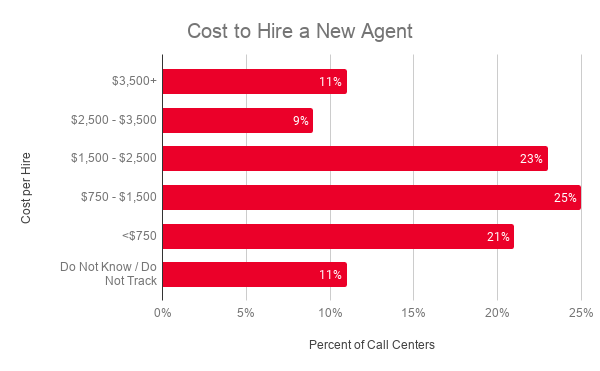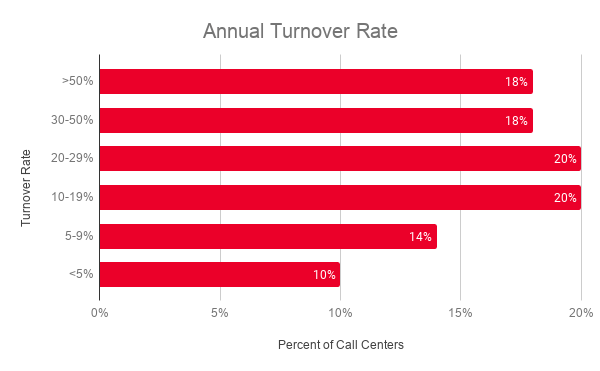Candidates: Are you interviewing and need support?
The call center is the hub of your customer experience. A great call-in experience keeps customers loyal and engaged; a bad experience can drive them away.
33% of consumers say they would consider switching companies after one bad experience. 60% say they would consider switching companies after 2-3. (American Express, 2017)
Call center recruiting is a unique challenge. Successful customer care agents need a unique combination of skills and aptitudes, and many call centers experience very high turnover. While recruiting numbers for individual call centers vary considerably, it’s important to benchmark to see if your recruiting strategy is on the right track.
1) How much does it cost to hire a call center employee?
On average, it costs around $2,500 to hire a new agent, according to ContactBabel’s 2017 US Contact Center Decision-Maker’s Guide.
 Source: ContactBabel, 2017. “US Contact Center Decision-Makers’ Guide 2017.”
Source: ContactBabel, 2017. “US Contact Center Decision-Makers’ Guide 2017.”This breakdown does not change significantly when you look at call centers by size. Small, medium, and large call centers all generally spend the same amount to recruit a new agent.
There is a significant difference in recruiting costs for call centers engaged primarily in outbound calling. 42% of these spend under $750 to hire a new agent.
2) Time to Fill
Time to fill varies widely from call center to call center, and from industry to industry.
In financial services, it takes an average of 38 days to fill a customer service agent role. Averages in other industries are in this same range, approximately 40 days. But fill times in individual companies range from just five days to 45 weeks.
3) Attrition and Turnover
Like cost to fill, attrition varies widely from call center to call center. While the average annual attrition is 30%, many organizations experience attrition rates over 50%.
 Source: ContactBabel, 2017. “US Contact Center Decision-Makers’ Guide 2017.”
Source: ContactBabel, 2017. “US Contact Center Decision-Makers’ Guide 2017.”
4) Managing Attrition
59% of call center managers “Agree” or “Strongly Agree” that HR issues (attrition, recruitment, agent skill set) are holding them back. When it comes to managing attrition, there are a couple things you can do from the recruiting side of things to keep it to a minimum.
Raise Base Pay
For call center agents with a starting salary around $30,000, less than 10% turnover within their first six months of employment. For agents with a starting salary around $25,000, more than 25% turnover within their first six months.
A 20% salary bump reduces attrition at the 6-month mark by more than half.
Curb Attrition with Recruiting
The #1 reason call center managers give for attrition is “the employee was just the wrong type of person for the job.” The #2 reason is “excessive pressure or stress.”
Recruiting can help solve both of these problems with pre-hire assessments.
Pre-hire assessments are a scientific way to evaluate candidates consistently, and against relevant criteria. They can:
- Identify the candidates most likely to succeed on the job;
- Identify the candidates most likely to turnover.
Incorporating a pre-hire assessment as part of the hiring process effectively scales a recruiting team, and enables them to make great hiring decisions consistently. More than 50% of call centers use some sort of pre-hire assessment to evaluate applicants.
With this in mind, it’s also important that a pre-hire assessment provides a candidate-friendly experience to avoid unnecessary candidate drop off. Many assessments are lengthy, multiple-choice tests; when candidates are applying for multiple jobs in their area, they aren’t likely to prioritize what they see as an exam.
5) The Most Important Skills for Call Center Agents
In Deloitte’s Global Contact Center Survey report, 46% of contact center leaders said “customer experience & satisfaction” will be their most important issue in the next two years. Compare this to the 15% who said “costs” would be the most important, and the 3% who said “revenue” would be the most important.
This makes sense, considering that 69% of consumers say they spend more with a company that offers a good customer service experience.
ContactBabel identifies six main competencies for call center agents:
- Dependability;
- Customer focus;
- Empathy;
- Problem-solving;
- Ability to understand & follow instructions;
- Ability to focus on a goal.
While the above competencies can be learned on the job, these are all skills that can be identified during the hiring process.
Identifying the Most Important Skills for Call Center Agents
When you can identify the presence of critical competencies (or lack thereof) in a candidate, you set your contact centers up for success. These are three field-tested ways you can refine your hiring process to deliver the best talent:
- Leverage pre-hire assessments. 85% of the companies Aberdeen considers “Best in Class” use some sort of pre-hire assessment. As mentioned above, pre-hire assessments don’t just reduce turnover, they identify the key competencies required for success on the job. Pre-hire assessments can give great insight into how a candidate works with people, as well as general cognitive competencies, like their ability to understand instructions and focus on a goal.
- Use situational judgment questions in interviews. Situational judgment questions ask candidates to act out or describe how they would handle a hypothetical scenario. These sorts of questions give good insight into their customer focus, empathy, and problem-solving skills. If you deliver these questions via on-demand video interview, you can even present the scenario as a video.
- Use past behavior questions in interviews. Past behavior is the best predictor of future behavior. Past behavior questions - asking candidates how they responded to challenges in their past - give good insight into their dependability, customer focus, and problem-solving skills.
Ideally, your interviews should be structured. Structured interviews are 34% better at predicting job success than unstructured interviews; they are also 3x more predictive than work experience, 2x more predictive than work references, and 5x more predictive than years of education.




